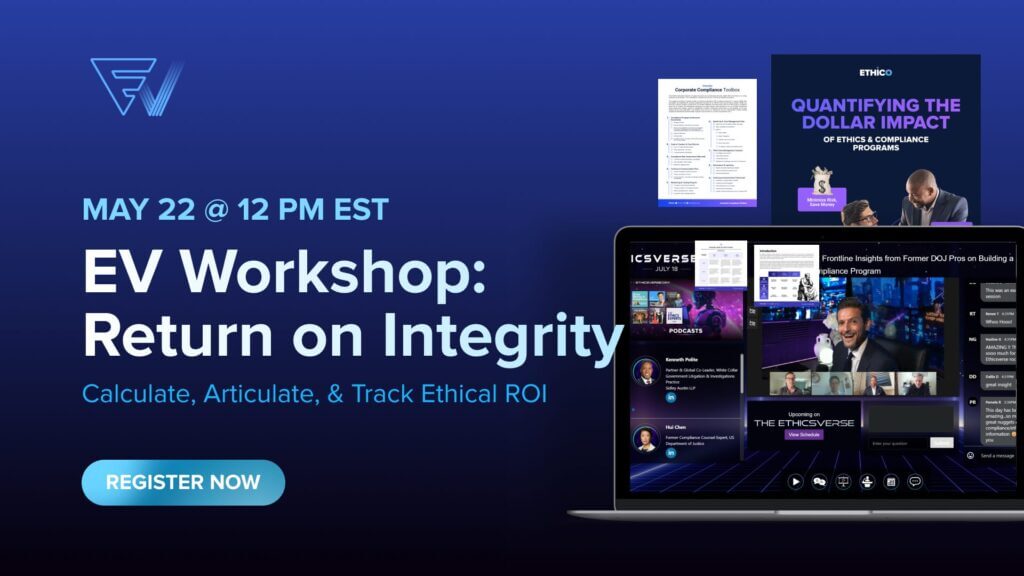Sustainability in a New Era: Challenges & Tips 🪴🧪


Full Episode Available
WATCH ON-DEMANDSustainability reporting has become the wild west of compliance—with multiple sheriffs, conflicting rules, and high stakes for those who can’t navigate the terrain. As organizations struggle to connect sustainability reporting with established business practices, compliance professionals offer the perfect bridge between aspiration and implementation.
This episode of The Ethicsverse examined the transformative role of compliance professionals in sustainability reporting and governance frameworks. The discussion illuminated how the Committee of Sponsoring Organizations of the Treadway Commission (COSO) Internal Controls Framework can be effectively mapped to sustainability reporting requirements, creating a structured approach to what has traditionally been a fragmented landscape. Hileman provided a comprehensive analysis of how sustainability reporting differs fundamentally from financial reporting—particularly in its reliance on narratives rather than numbers, its forward-looking nature, and its dependence on data from entities outside organizational control. The presentation explored the evolution of voluntary sustainability frameworks into mandatory compliance requirements and emphasized the strategic importance of proactive engagement with emerging standards.
- Douglas Hileman, President, Douglas Hileman Consulting LLC
- Nick Gallo, Chief Servant & Co-CEO, Ethico
Bridging the Knowledge Gap
- The COSO Internal Controls Framework has evolved from financial reporting to become an essential tool for sustainability reporting through the publication “Applying Enterprise Risk Management to Environmental, Social and Governance-related Risks.”
- Compliance professionals uniquely bridge the communication gap between internal controls experts (accounting/finance) and sustainability data providers (HR, environmental, operations).
- This bridging function is increasingly critical as sustainability reporting shifts from voluntary marketing efforts to mandatory regulatory requirements demanding financial-level rigor.
From Voluntary to Mandatory Evolution
- Sustainability reporting follows a predictable pattern from voluntary initiatives to mandatory compliance requirements, mirroring the development of financial standards like Sarbanes-Oxley.
- Companies proactively developing robust frameworks based on emerging global standards will be prepared when regulations become mandatory, while reactive organizations will struggle with implementation.
- California’s climate disclosure laws, aligned with global frameworks, preview broader requirements likely to emerge nationally and internationally.
Compliance’s Expanding Role
- Compliance professionals possess invaluable skills in navigating ambiguity and creating standardized documentation processes that directly transfer to sustainability reporting challenges.
- Their expertise in developing workflows, implementing controls, and driving continuous improvement positions them as ideal candidates to lead sustainability initiatives across diverse topics.
- This expanded role represents a significant opportunity for compliance teams to increase their strategic value while proactively addressing emerging risks.
The Business Value Proposition
- Sustainability reporting directly impacts an organization’s intangible market value, which now constitutes the majority of total market capitalization for most publicly traded companies.
- Public sustainability disclosures contribute significantly to reputation and goodwill—assets that can be instantly damaged by ethical lapses or reporting inaccuracies.
- Compliance professionals who frame initiatives in terms of risk management and market value protection position themselves as strategic business partners rather than cost centers.
Beyond Climate Focus
- While climate reporting dominates current sustainability conversations, forward-thinking professionals should monitor emerging areas, particularly human capital and natural resources management.
- Organizations in food processing will face increasing scrutiny regarding natural resources, while companies with labor-intensive operations will encounter growing demands for human capital disclosures.
- Staying ahead of emerging topics allows compliance teams to develop measured approaches rather than rushed implementations.
Imposter Syndrome and Strategic Entry Points
- Many compliance professionals experience imposter syndrome regarding sustainability initiatives, fearing their lack of specialized knowledge will undermine credibility.
- This hesitation should be recognized as evidence of caring deeply about performance rather than as a legitimate barrier to participation.
- Asking fundamental questions like “Help me understand our objectives here” positions compliance as a valuable proxy for external stakeholders while highlighting process improvements.
B2B Reporting Requirements
- Business-to-business sustainability reporting requirements create significant but often overlooked compliance obligations through sustainability commitments embedded in vendor contracts.
- These contractual commitments may not reach traditional compliance registers because they typically enter through sales teams or procurement departments.
- Compliance professionals should proactively identify these contractual sustainability commitments, as vendors have been removed from supply chains for failing to meet such obligations.
Sustainability vs. Financial Reporting Differences
- Sustainability reporting differs from financial reporting by often requiring information from business partners and supply chains outside direct organizational control.
- Where financial reporting centers on quantitative metrics, sustainability reporting frequently demands narrative descriptions of processes requiring different control methodologies.
- Sustainability reporting often includes forward-looking commitments that create expectations for future performance reporting, necessitating monitoring systems to track progress.
Quick Wins Through Pilot Approaches
- Implementing sustainability compliance initiatives benefits from starting with small, focused pilot efforts rather than comprehensive programs.
- Beginning with “baby bear” procedures allows organizations to establish templates and approval processes that can later scale to more complex “papa bear” requirements.
- This incremental approach builds confidence, demonstrates value, and creates quick wins while allowing teams to learn before tackling more challenging aspects.
HR’s Underutilized Potential
- Human Resources departments are significantly underutilized in sustainability compliance efforts despite their ability to formalize responsibilities and provide necessary structural support.
- Sustainability reporting responsibilities often become unofficial “volunteer” assignments representing 20% of someone’s job that must somehow fit between 120-140% of their existing workload.
- HR can play a crucial role by incorporating sustainability responsibilities into formal job descriptions, ensuring appropriate training, and integrating sustainability performance into review processes and compensation structures.
Closing Summary
Sustainability reporting and compliance represent a fundamental shift in how organizations demonstrate responsible business practices to stakeholders across their value chain. As these requirements transition from voluntary frameworks to mandatory regulations, compliance professionals have a unique opportunity to apply their expertise in navigating ambiguity, developing robust controls, and implementing effective monitoring systems. By positioning themselves as strategic partners who understand both the technical aspects of reporting and the business value of sustainability initiatives, compliance teams can drive meaningful organizational change while enhancing their own strategic importance. The future of sustainability compliance will require cross-functional collaboration, proactive risk management, and the ability to translate complex requirements into practical business processes—all core strengths of effective compliance professionals who embrace their expanded role in this evolving landscape.






































